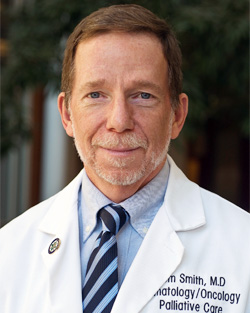
Harry J. Duffey Family Professor of Palliative Medicine and
Director of Palliative Medicine, Johns Hopkins Medical Institutions
Professor of Oncology, Sidney Kimmel Comprehensive Cancer Center
Training
University of Akron, B.S., summa cum laude 1971-74
Yale University School of Medicine, M.D. cum laude 1974-79
Yale University School of Organization and Management (core curriculum, one year) 1977-78
Special Visiting Fellow, National Cancer Center Biological Response Modifiers Program, Frederick, MD 1986
Virginia Commonwealth University Fellowship in Hematology/Oncology 1982-87
Project on Death in America Faculty Scholar, 1995-98
Current position
Professor of Oncology, Sidney Kimmel Comprehensive Cancer Center of Johns Hopkins, and the Harry J. Duffey Family Professor of Palliative Medicine, and Director of Palliative Medicine, Johns Hopkins Medical Institutions, Baltimore, MD
Dr. Smith is a medical oncologist and palliative care specialist with a lifelong interest in better symptom management, open and accurate communication, and improving access to high quality affordable care. He is the Director of Palliative Medicine for Johns Hopkins Medicine, charged with integrating palliative care into all the Johns Hopkins venues. The hospital wide PC consult service sees over 1500 patients a year, runs a 6-bed inpatient PC unit, and has a growing research agenda with “Scrambler Therapy” for pain, decision aids, integrated palliative care for patients on Phase I drug trials, and communication about serious illness.
Dr. Smith has a long track record of starting innovative programs with concurrent evaluation of their impact on care and costs, including the Virginia Rural Cancer Outreach Program, the Thomas Palliative Care Program, the Virginia Initiative on Palliative Care, and the Rural Palliative Care Program, among others. He attends on the Longcope Service of the Osler Medical Housestaff training program as well as in Palliative Care.
Dr. Smith received the national Humanism in Medicine Award in 2000, and in 2000 and 2006 was voted the Distinguished Clinician on the VCU-MCV Faculty. He has been recognized in “Best Doctors in America” for many years. He is a Fellow in the American College of Physician, the American Society of Clinical Oncology and the American Academy of Hospice and Palliative Medicine. In 2012 Bruce Hillner and he received the ABIM “Professionalism” Price for their NEJM article “Bending the Cost Curve in Cancer Care” and leading the “Choosing Wisely” initiatives for AAHPM and ASCO.
He is a 2010 ACS grantee to study the absorption of "ABH" gel as used for nausea; his other funded research includes an RO1 for a randomized trial of PC versus usual care for Phase I cancer patients, PC for pancreas cancer patients, patient-decision aids, and "scrambler" therapy for pain.
緩和ケアの有効性と費用対効果
要約
背景:世界的に、医療は病院や集中治療室の利用の増加とともに、集中的に複雑にそして高額なものになってきている。加えて、患者は慢性疾患や併存疾患を抱え高齢化してきている。人々は、医療行為によって病気を患いながらも長く生きることが可能になってきている。医療行為の中には革新的で非常に高額なものがある。世界中の国において、このような要因により医学的ケアの経済的問題が切実なものになってきている。緩和ケアは、QOLの改善、ケアの質の改善、ケアの費用を減らすことなどに対する可能性をもつ。
方法:経済・政策解析などの文献の系統的レビュー
結果:満足な費用対効果をもつ治療において、その治療はまず有効なものでなければならない。緩和ケアが有効であるということには何の疑問もない。緩和ケアの有用な研究では、緩和ケアの介入は相当な費用の節約になり大変満足な費用対効果を示しており、緩和ケアを受けていないものに比べると亡くなった人に対する入院費を20から60%まで削減できる(Smith T, et al. JPM 2003; Elsayem A, et al, JCO 2004)。ニューヨーク州では、緩和ケアプログラムをもつ病院では、1回の入院当たり$5000以上の削減になった(Morrison RS et al. Health Affairs 2011)。日本(Morita T, et al. Lancet Oncology 2013)やドイツのプログラムでは、同等か低い費用で同等か良好なケアができることを報告している(Gaertner J, et al. Health Policy 2013)。幾つかの無作為試験では同等以上のケアの提供と一人当たり$4500-7000削減できたことが示された(Brumley R, et al. JAGS 2007; Gade G, et al. JPM 2008.)。肺がん患者において、標準腫瘍治療ケア群と標準腫瘍治療ケアに緩和ケアを並行して提供した群をランダマイズした研究を行ったところ、QOL、ケアの質、生存期間の延長が見られ(Temel J, et al. NEJM 2010)、一人当たり$2000以上の費用削減になった(Greer JA, et al. Proc ASCO 2012)。多発性硬化症の患者で緩和ケアを受けているものでは、試験期間中と試験6週後くらいまで良好な臨床的成果が得られ、緩和ケアを受けていなかった患者に比べて、イギリス国民医療制度で1,200ポンド低い費用であった(Currow DC, et al. JPM 2011; Higginson I, et al. Post Med J 2009)。
現在まであらゆる研究で、ホスピス・緩和ケアは同等かより長い生存期間、そして同等かより低い費用に関連しているということを示している(Hughes M, Smith TJ. Annual Rev Public Health 2014)。このような説得力のある圧倒的なエビデンスにもかかわらず、国の政策レベルでの受け入れは、最適とは言い難い(Parikh RB, Kirch RA, Smith TJ, Temel JS. N Engl J Med. 2013)。
結論:緩和ケアが注目されている理由として、良好な症状マネジメント、アドバンス・ケア・プランニング、医学的に適切な目標の設定、適当な時にホスピスケアへ移行することにつながっていくということがある。他の新しく見出された注目される理由として、ホスピス・緩和ケアを受けながらより長い生存期間が得られたこと、入院費、財政資金、保険資金の費用が低くなるといったことがある。早期からそしてもっと広く緩和ケアを受けることは、将来において臨床的にも経済的な理由でも重要であろう。
(邦訳:小池和彦)










